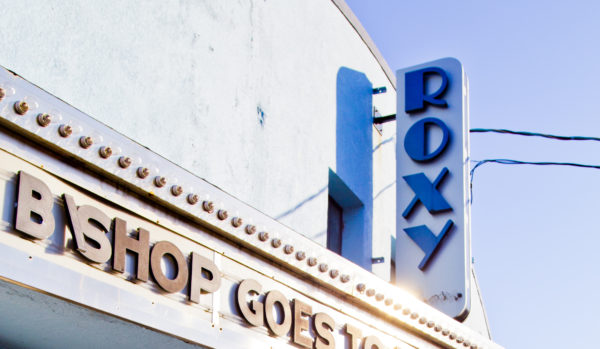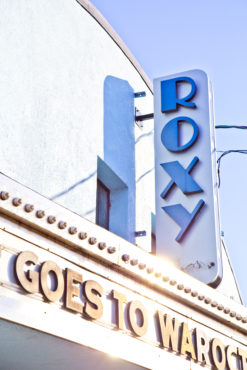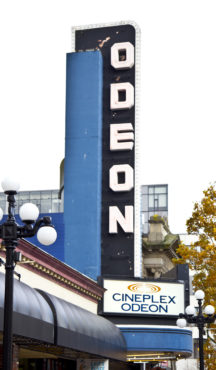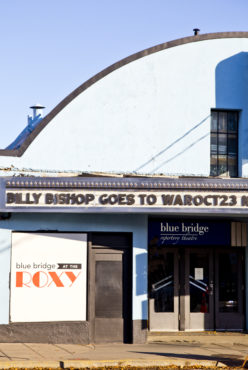Local theatres anticipate the next act as streaming shifts movie-watching culture
Here lies the independent cinema: The Roxy Classic Theatre — opened as The Fox on February 1, 1949 — closed its doors to moviegoers in December 2013. The movie theatre lived and died on Quadra Street and it was one of Victoria’s last remaining repertory cinemas. The Roxy lived a unique life, changing genres, names, and owners many times, and for 65 years it was a familiar place for movie-lovers to return to. Generations of Victorians can say they remember gathering outside the blue box office. Over the course of its life, The Roxy touched many hearts and will be lovingly remembered by the community of Greater Victoria.

All photos by Belle White, Photo Editor.
Unfortunately, movie theatres don’t get funerals, and people don’t congregate to share their fond memories and celebrate the life of the theatre. Movie houses often just quietly stop showing movies and fade away — it is just a theatre after all. But movie theatres are where memories are made, where first dates take place, and where you can visit another country or even another world from the comfort of your seat.
Nowadays, when you decide to watch a movie on a Friday night, you might check Netflix or Hulu for something good. Most of us don’t immediately think of heading to the movie theatre anymore — it’s less convenient and it’s way more expensive.
According to a CBC article, Solutions Research Group reported that approximately 5.2 million Canadians were paying for Netflix subscriptions in 2016. Additionally, about 1 million Canadians were using Kodi software to stream video content in 2017 according to Sandvine, a tech company in Waterloo. As a result, independent and chain-theatres alike are seeing less traffic as people opt to stream movies from home, and small cinemas, like The Roxy Classic Theatre in Victoria, have had to stop showing movies entirely.
FOXY NIGHTS AT THE ROXY
The Fox — later named The Roxy Classic Theatre — was made out of a surplus shelter from the Second World War. The building was repurposed in 1949 by George Walky, a pharmacist who owned the drug store across the street from where the theatre would eventually land near the corner of Quadra and Hillside. The dome-shaped shelter, known as a Quonset hut, stands out with its robin-egg blue façade, and has become a landmark in Quadra Village.
Walky and his projectionist Ed Nixon ran the theatre until 1966. The new owner, Barney Simmons, played new releases for a few years before shifting to adult films when it became too hard for independent theatres to get new movies. Simmons later renamed it the Quadra Theatre in the 1970s when he wanted to “change the porno association,” says Howie Siegel, who eventually bought the theatre from Simmons in 1986.
For Siegel, running a studio to make movies was the original dream. Siegel — an outspoken, Brooklyn-born entrepreneur — already owned Pagliacci’s, a popular Italian restaurant in downtown Victoria that opened in 1979.
Owning a movie theatre became a way for him to connect with the movie business. He bought the theatre with his brother, David Siegel, and a real-estate agent named David Butterfield. Siegel changed the name to The Roxy Cinegog — “where movies are religion.” Cinegog was a reference to the Greek word synagogue, which means “to bring everybody together.” Siegel hoped his theatre would be a place for film lovers to come together and experience the magic of movies.
One of [The Roxy Cinegog’s] most unique characteristics was the make-out seats — or as Siegel playfully dubbed them: “the nursing and necking seats.”
Siegel’s first day at The Roxy was a blur. 28 Up was the movie playing that day because it had a devoted following, says Siegel. You could run a popular movie as long as people would come to see it, so hit movies would sometimes run for five or six months. But Siegel didn’t know that at first.

“I was naïve,” he says. “I got bored of the same movie over and over, so I changed it.”
Siegel quickly learned that you need to find a balance between quality entertainment and good financial decisions when running a theatre. “That’s the movie business in one sentence,” says Siegel.
The Roxy Cinegog was one of a kind and people knew that. One of its most unique characteristics was the make-out seats — or as Siegel playfully dubbed them: “the nursing and necking seats.” The seats came without armrests, but Siegel did the upholstery himself.
“If you could prove that you were conceived in those seats, you got free popcorn,” says Siegel with a chuckle.
The Rocky Horror Picture Show was always a popular showing at The Roxy.
“We were the Rocky Horror headquarters,” says Siegel. “It was a happening.”
Although Rocky Horror was a fan favourite, Siegel’s favourite movie to show at The Roxy was Cinema Paradiso.
“[It] was magnificent …There wasn’t a dry eye in the house whenever the ending came.”
Siegel made sure he never missed the last scene. “I still cry like a baby to this day,” he says.
While The Roxy Cinegog was a movie house, Siegel also booked other live events, including performances by bands like the Dirty Rotten Imbeciles. At that particular show, Siegel recounts that a mosh pit broke out.
“They almost destroyed the theatre! Someone even unloaded one of the fire extinguishers on the audience.”
Eventually, even with the extra events, repertory became unfeasible, so Siegel decided to start showing foreign films.
“It worked really well until chain theatres started booking subtitled films,” he says. “That really finished me off.”
The Roxy was no longer the only place to see a foreign movie in Victoria, so it had to adapt to the changing times. On the advice of Pierre Gauthier — who still manages the Cineplex Odeon in Victoria — Siegel started doing two for one discount double bills.
“That’s what we became known for in the last 15 years,” he says. The double bills were inexpensive and offered moviegoers a unique experience.
A TOUGH BUSINESS
While theatre-chains such as Cineplex Entertainment have played their role in stamping out repertory and independent cinemas like the Roxy, they too have seen a decline in moviegoers. According to the National Association of Theatre Owners, the average movie ticket price in the United States has risen almost four per cent since 2016, while the number of tickets sold has declined by six per cent.
As ticket prices rise, people are opting to save money by watching movies at home.
Streaming is having a huge impact and the whole movie-going industry is struggling to deal with it, says Stuart Angus, owner of the Golden Cinema in Golden, B.C.
“Many small-town theatres were unable, or unwilling to [adapt] and unfortunately they have closed,” says Angus. He says some theatres try to minimize the impact of streaming by “playing movies as close to the release date as possible – before it’s all over the internet.”
Big movie chains may have first dibs on big films, but that’s still a tough business. Gauthier has been working in theatres since he was ten and comes from a long line of theatre owners. His grandfather bought The Rex in Quesnel, B.C. in 1917 and ran it until 1947 when Gauthier’s father took over.
“In a city like this, I think [independent theatres] are a thing of the past.”
After growing up at the movie theatre, Gauthier went to Calgary in 1960 and worked at The Grand Theatre — which was owned by the Barron family and Odeon.
“I’ve been in this business ever since,” he says. “Always with my family or Cineplex.”
Gauthier took over management of the Cineplex Odeon Victoria in 1981.

“[The] theatre is 72 years old,” he says. It was built in 1948 by Odeon and was renamed when Cineplex Entertainment bought out Canadian Odeon Theatres in 1984.
Despite the changes the theatre has gone through over the years, it “still has the same charm,” says Gauthier.
It’s now a seven-plex he says, but there was originally only one theatre.
“The other big change was going from film to digital. Which is the best thing that ever happened,” says Gauthier. He doesn’t miss carrying the hefty film canisters.
The Cineplex Odeon Victoria is not just home to reclining seats and good popcorn. They also still have their original 1948 projection booth which sits high above the theatre. The room is up a narrow flight of cement stairs, and at the top is a huge metal door which is left over from the era of highly-flammable cellulose nitrate film. The door looks like it belongs on a bomb shelter, as the projection rooms had to be sealable in case the combustible film caught fire from the heat of the projector lamp.
The room itself is like something out of an old photograph, with a large, modern projector in the middle. Light filters through chips in a window that’s been painted black. The paint-coated view looks out over the roof of the theatre’s foyer and on to Yates Street.
The movie playing below — A Wrinkle in Time, fittingly — is barely audible over the white-noise of the projector. At the back of the room, there is a little toilet stall and a sink.
“When we first opened there were two projectionists up here and they couldn’t leave [during the film],” says Gauthier. “If anything should happen, they’d shut everything down. The whole thing would just close right up.”
Projection rooms like the one at Cineplex Odeon Victoria are unnecessary now.
But what makes the movie-going experience special is the atmosphere, he says. “It’s the smell of the popcorn.”
“We can run all seven theatres from [one computer],” Gauthier says. “I think [we have] the only original style projection room left in the country.”
Along with all the drastic technological changes in the theatre, Gauthier acknowledges that movie-going has changed with streaming.
“Traditionally, you shouldn’t be able to watch a movie at home but now you can,” says Gauthier.
But what makes the movie-going experience special is the atmosphere, he says. “It’s the smell of the popcorn.”
Capitalizing on creating an overall experience and pairing it with the draw of really good movies, Gauthier feels that Cineplex is handling the changes to the movie industry particularly well.
“It’s a struggle. There’s no question. But we’re a very bright, [forward-thinking] … company.”
Gauthier speaks kindly of other movie theatre owners in Victoria and has been known to help out where he can — as he did with Siegel by suggesting the double bills.
“We’re the big boys and we try to look after people and try to be nice to people,” he says.
While Gauthier isn’t worried about the future of chain theatres, his prediction for the future of independent theatres like The Roxy is bleak.
“In a city like this, I think they are a thing of the past,” says Gauthier.
THE NEXT ACT
Although the Roxy was an important landmark in the Quadra Village neighbourhood, it struggled because it wasn’t the only theatre in Victoria. After years of running The Roxy Cinegog and trying many different business models, Siegel eventually sold the theatre to Michael Sharpe in 2007. He renamed it The Roxy Classic Theatre and followed the same double bill business model that Siegel had used.
Since then, The Roxy has gone through yet another change, becoming the operating ground of the Blue Bridge Theatre Company in 2013. While their plan was to continue showing second-run movies with the added aspect of live theatre, they started losing money, and in December of 2013, they decided to stop showing movies for the foreseeable future.
Despite not being able to sell enough movie tickets, The Roxy has been a nice home for the theatre company.
“It’s a good space for community,” says Brian Richmond, UVic professor and artistic director of the Blue Bridge. “But we did have to build a stage and clean up the theatre.”

Sadly, a piece of The Roxy’s classic history had to be removed during the renovations.
“The make-out seats had a lot of history,” says Richmond, but “they were the first thing to go when we took over.”
With the shift towards streaming, will independent theatres continue to shut down or stop showing films? Where will we go to watch The Rocky Horror Picture Show and throw toast? Watching movies at home is not the same as watching them in the theatre, but do we care? From the artificial yellow of the popcorn, to the car commercials that are always way louder than the movie, to sharing an armrest with a stranger, “nothing compares to the big screen experience,” says Richmond.
“The Roxy is like a phoenix … It has reinvented itself.”
According to Richmond, the movies at The Roxy are only suspended, and he hopes the Blue Bridge can eventually come up with a systematic and lucrative way of paying tribute to the history of The Roxy. Eventually Richmond hopes to show new Canadian films and movies that complement the Blue Bridge’s live plays.
While Siegel is disappointed that there are no more movies at The Roxy for now, he is glad that the Blue Bridge has given the theatre a new life. He spent a lot of time in the oddly shaped blue building, and Siegel looks back fondly and nostalgically on his time at The Roxy.
“I did have fun. I never felt like I was working,” he says. However, being in the office every day and doing behind the scenes tasks isn’t what he misses.
“I miss being 23,” he says. “I miss dropping acid more than I miss running the theatre.”
Richmond is looking forward to seeing The Roxy continue to adapt to its new life as a live theatre house.
“The Roxy is like a phoenix,” he says. “It has reinvented itself.”






